Even if you don't live in Greater Philadelphia, you may be familiar with Jeffrey Brown, a fourth-generation grocer who is chairman and CEO of Brown's Super Stores. About half of the 12 ShopRite and Fresh Grocer stores Jeff operates are located in “food deserts” — urban areas where residents lack access to stores selling fresh food.
You may recall Jeff from President Barack Obama's 2010 State of the Union address, when the grocer was among Michelle Obama's guests. Jeff was an adviser to the Healthy Food Financing Initiative, part of the first lady's “Let's Move!” campaign aimed at ending childhood obesity.
You might have seen Jeff in 2015 on PBS NewsHour, which praised his work to build “an oasis in a Philadelphia food desert.”
More recently, you might have seen him on CNN, lamenting slow police response to the looting of two of his stores amid the national unrest after the killing of George Floyd, a Black man, by Minneapolis police.
Jeff, his family and store personnel rushed to reopen the two decimated stores within a week to ensure his customers had a source of fresh food and the other services his ShopRites provide.
After the looting, “We must've received 15,000 notes from customers,” says Jeff, 56. “A lot of them felt bad that there wasn't something they could do to prevent this. And they just wanted to express a lot of love and affection for the work we do and our commitment to them.”
The word “love” comes up frequently when Jeff speaks about his relationship with his urban customers. That 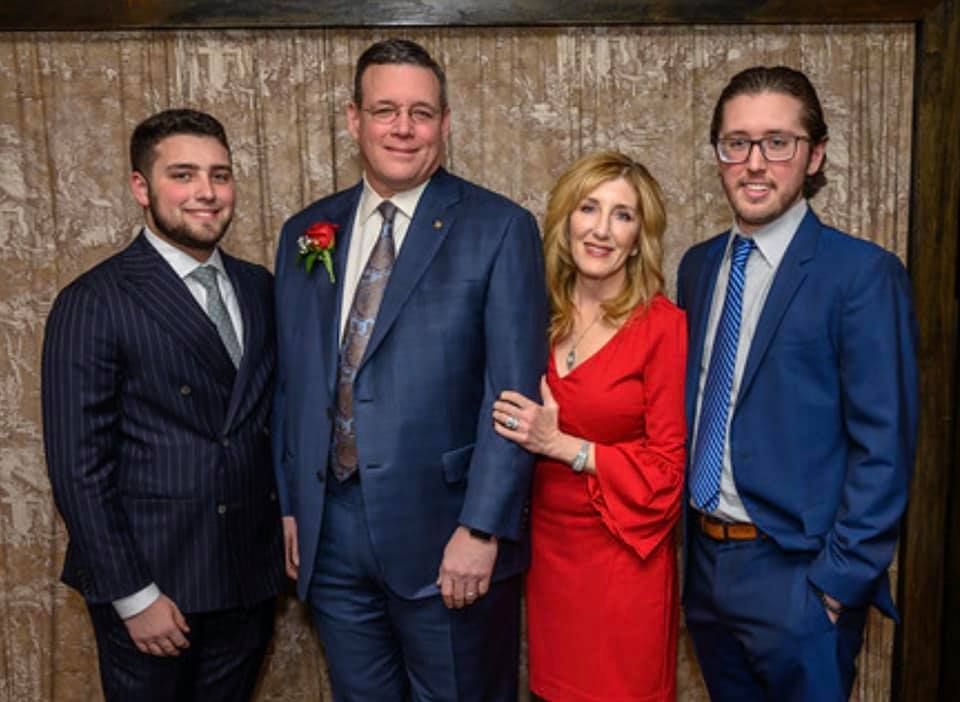 relationship dates back generations.
relationship dates back generations.
Jeff's great-grandfather opened a small grocery store in an inner-city neighborhood, and the family has been serving low-income shoppers ever since. Jeff recalls accompanying his father to work at age 8, chatting with customers and employees. He grew up viewing ethnic diversity as normal. Today the majority of customers in his urban stores are Black.
Brown’s Super Stores' mission is “to bring joy to the lives of the people we serve.”
“If you're building a business basically to bring joy to people that have very little joy in their lives and it's going to be super difficult to do it, you have to be motivated,” Jeff says.
The mission helps unite a multiethnic team around a shared purpose and a roadmap to achieve it. Brown's Super Stores doesn't just sell groceries; the company aims to solve problems in the communities where its stores are located.
Food desert economics
When his father sold his stores to a public company in 1987, Jeff, the 23-year-old CFO of the business, decided to open his own stores. He joined Wakefern Food Corp., a buying cooperative whose brands include ShopRite and the newer Fresh Grocer.
He opened his first store in December 1988, taking over a money-losing ShopRite in Philadelphia's Roxborough neighborhood. The young entrepreneur, who graduated from Babson College and in 2012 was named to the school's Hall of Fame, earned credibility by orchestrating a turnaround of the store. He opened two more stores in 1995 and 1999.
Jeff's wife, Sandy, says her husband's devotion to the business comes from his father, Lenny, who died in 19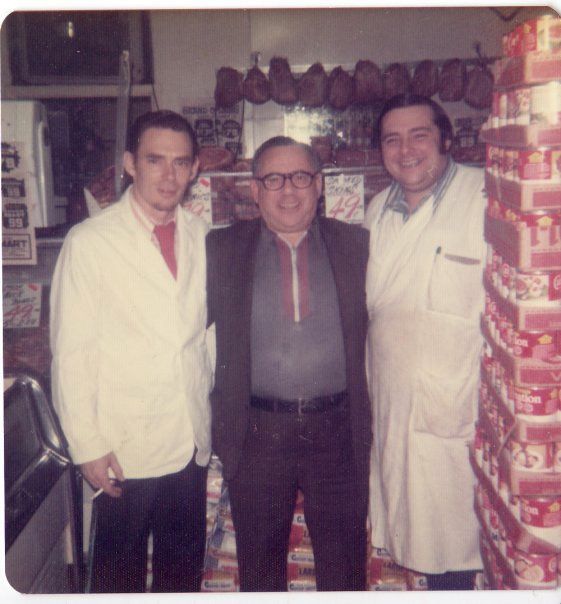 95.
95.
“A job is a job,” Sandy says. “But if you have an excitement and a passion about something, that's what makes the difference. I think his father Âreally gave him that passion and that love.” Sandy, Jeff's executive assistant, has managed a variety of projects at the company over 25 years.
In 2000, Jeff opened his first store in an urban neighborhood, in a declining shopping center in Cheltenham, just outside the city limits.
While grocers' profit margins are low— about 1% to 3% of sales, depending on the item — the challenges are even greater for stores in low-income communities. The average sale is lower, and training, security and insurance costs are higher.
“We had done early work before we opened the first store to calculate that the gap was somewhere around 5% of sales,” Jeff says, comparing margins in poor and higher-income communities. “So instead of making that 1% of sales bottom line, it would be a 4% loss.”
Poor consumers buy lower-cost commodity items rather than value-added products, which yield higher margins. What's more, the challenges these consumers face — such as violence and dependence on public transit — also affect stores that serve them.
Most grocers bridge the gap in low-income areas by charging higher prices, paying lower wages and reducing quality standards. Jeff found a different solution.
“Our thought was that we could use entrepreneurial creativity to solve about half that gap,” he says. To make up the rest, “We would need some sort of financial engineering solution or a public-private partnership to give us a fighting chance. A lot of our innovations have to do with how we could take advantage of existing economic-development tools.”
Jeff has succeeded with this approach and is bringing it to others through a non-profit organization he founded.
“When they opened up the ShopRite, it made a lot of the grocery decisions much easier and much more convenient,” says Alexandra McFadden, board president of the Centennial Parkside Community Development Corporation, made up of residents and organizations in the West Philadelphia neighborhood where the Browns have had a store since 2008. Before then, many residents had to take a long bus ride or costly taxi to reach a grocery store, she notes.
Serving the community
In 2010, when the Browns launched their company's mission to bring joy to the lives of the people it serves, they 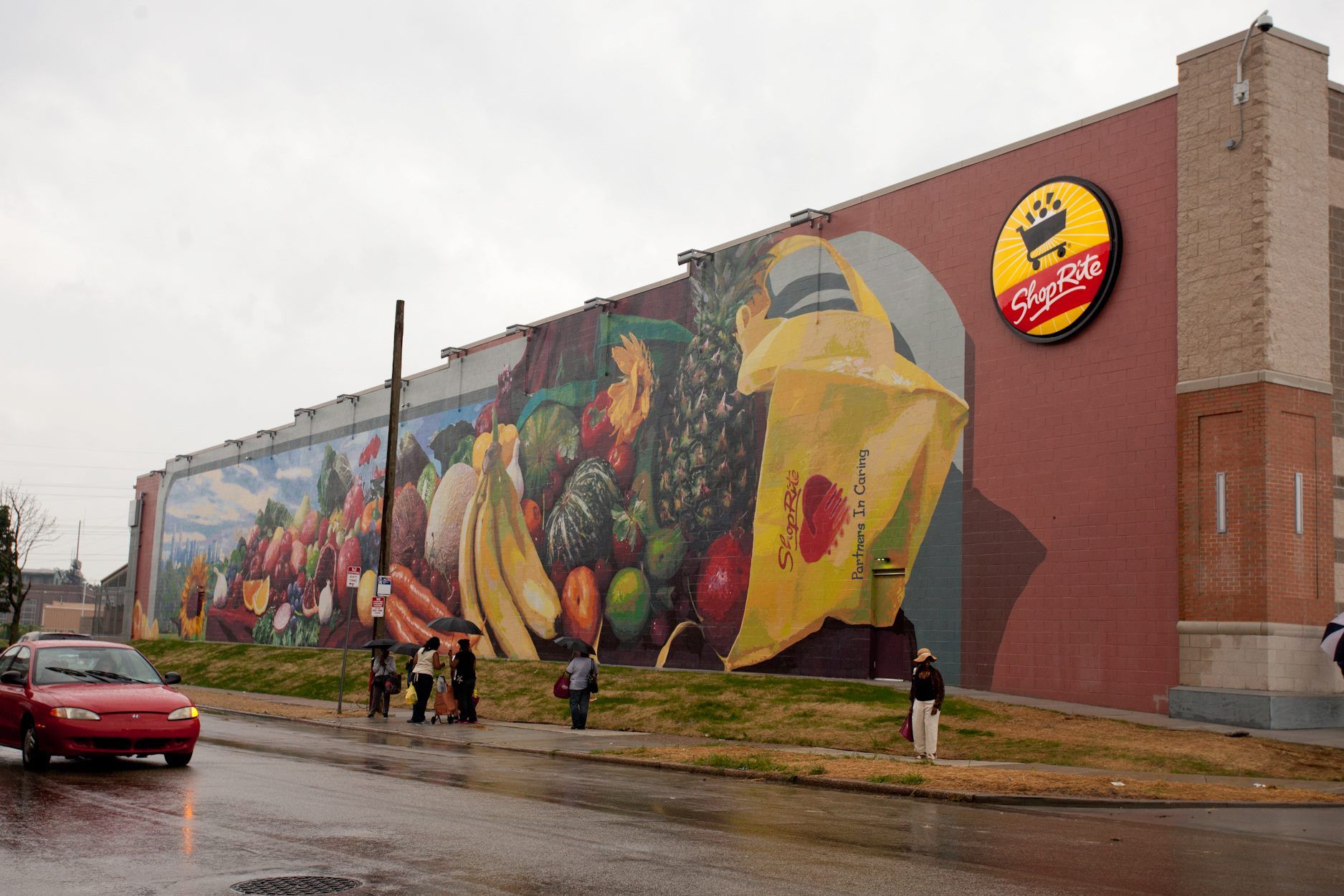 established four brand attributes: authentic products, affordability, community responsibility and an enjoyable shopping experience.
established four brand attributes: authentic products, affordability, community responsibility and an enjoyable shopping experience.
They also set out four core values: seek understanding, be flexible, show respect and act responsibly.
Before opening a store, they meet with community members to seek input on shoppers' expectations and how the store might meet their needs.
The Browns take note of community members' heritage and stock their traditional foods: halal meat for Muslims, ackee fruit for Jamaicans, fufu flour for West Africans, sweet potato pie for Black Americans. Competitors who stock specialty items in affluent neighborhood stores neglect this service in poor neighborhoods.
“We'll have people come into a store and [say], ‘I cannot believe you carry this product. I haven't seen this anywhere since I left my country.' That brings them joy,” Sandy says.
Some of the Browns' stores offer additional services, such as a pharmacy, ecommerce, a health clinic with sliding-scale fees and a credit union (with no minimum balance requirement, no monthly maintenance fee and no ATM fees).
The family's two Fresh Grocer stores offer prepared meals and high-quality perishables, emulating the Whole Fo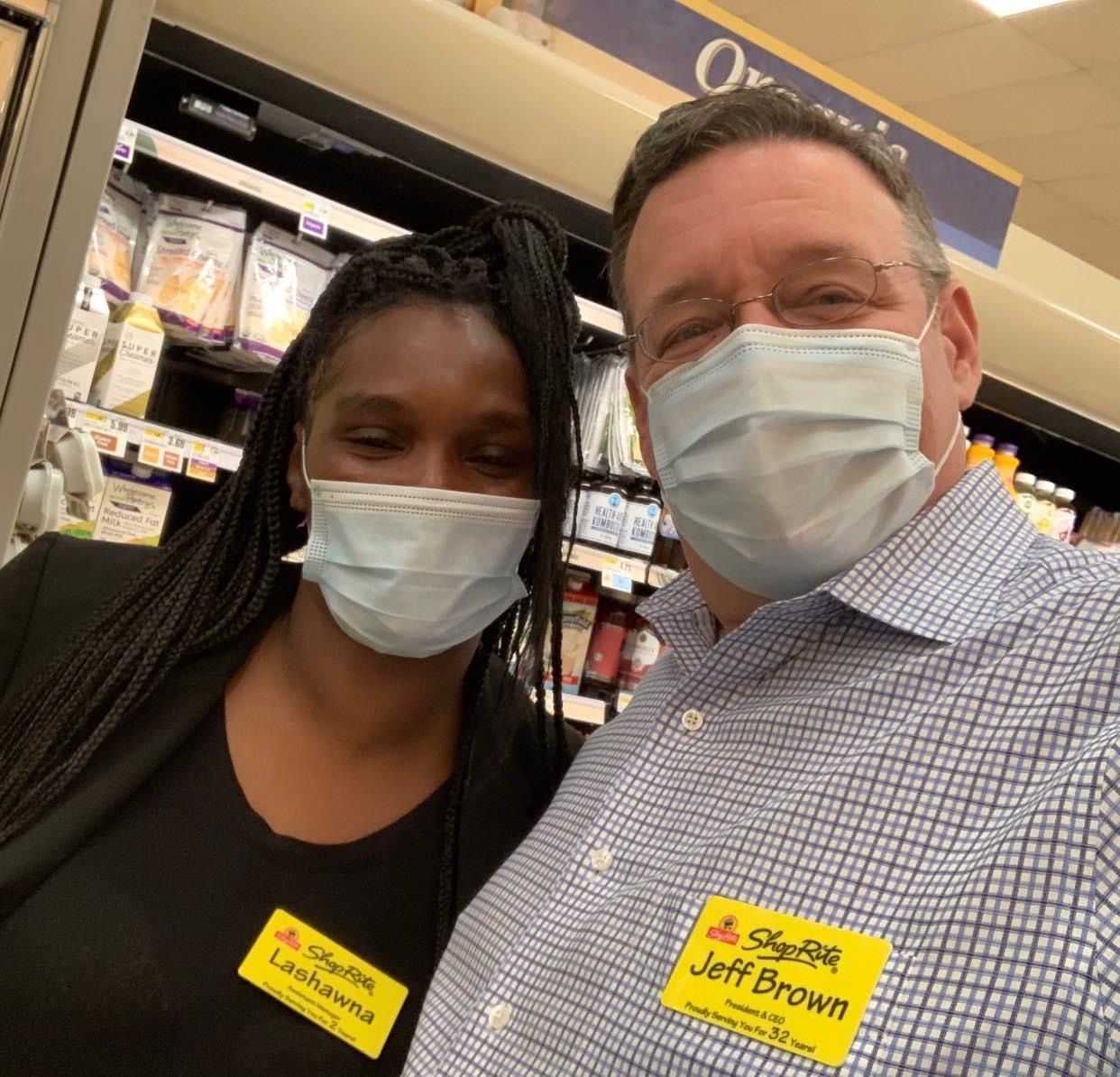 ods experience in neighborhoods where Whole Foods wouldn't open.
ods experience in neighborhoods where Whole Foods wouldn't open.
The Brown family is a strong supporter of community organizations.
“I put on a lot of events in the community,” says Tracey L. Fisher, founder and CEO of Gateway to Re-Entry, which provides education and support for returning citizens — people released from prison who are reintegrating into society. “Any time Gateway to Re-Entry called, Jeff automatically donated.
“Not only did he come physically and give his time and volunteer, but he does it as well through [donating] his products.”
Staffing up
Jeff's stores are unionized, as his father's were. Sandy says most of the workforce is drawn from the stores' neighborhoods, although employees are moved around as they rise within the organization.
“If I were to open a store in a suburban area, we would get lots of applications from experienced people in the food business,” Jeff says. In urban areas, there are exponentially more applicants because of high unemployment, but most lack experience. “In many cases, they may never have worked before.”
When Sandy joined the company, she developed its human resources function. At the time, Jeff was in the process of purchasing his second store.
Sandy had worked for Unilever and Revlon and had a strong HR background. “I recognized that I didn't have a world-class human resource capability,” Jeff says. “And I always marveled at what she did in that area.”
“I had no idea what you needed to be a good deli worker or how to train a deli clerk. So I had to basically learn all of those different positions, and then I proceeded to write the training programs,” Sandy says. “Over time, I gained the knowledge and the background on the interviewing style.”
At a town hall meeting to discuss the opening of the Parkside store in 2008, a community member urged Jeff to hire returning citizens.
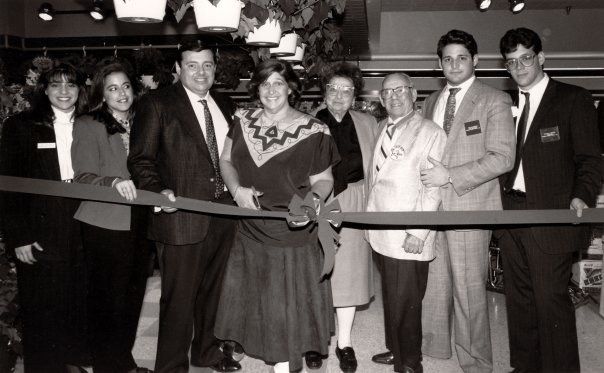 “She explained to me that a lot of people in West Philadelphia have a criminal record, and they're never going to be the type of customers they should because they can't get work. And maybe I had the capability to solve that problem,” Jeff recalls.
“She explained to me that a lot of people in West Philadelphia have a criminal record, and they're never going to be the type of customers they should because they can't get work. And maybe I had the capability to solve that problem,” Jeff recalls.
He took the suggestion to heart and hired six returning citizens, originally as an experiment. Today, about 700 of the company's 2,500 employees are returning citizens. Some hold store manager positions.
Fisher says when he was starting his organization, “Jeff Brown, literally personally, made phone calls to all his stores to hire my returning citizen guys. It made me more credible when I was going to the prisons and telling them, ‘When you come home, I got a job for you.' ”
The biggest issue with returning citizens, Jeff says, is not theft or violence but the use of street language in the workplace — a problem that can easily be fixed with training. He's found that turnover among these employees is low and loyalty is high.
Sandy, who has been involved in many aspects of the business, currently works on store design, customer relations, retail technology and social media. “She's been a tremendous contributor to the business,” Jeff says.
Jeff and Sandy's eldest son, Joshua, 29, has worked in the business for two years. Josh, who studied business at Cornell University, previously worked for a private equity real estate fund. At Brown's Super Stores, he's training to replace the company's longtime CEO, who plans to retire.
“I thought that his finance skills were just tremendous, and really were enhanced and refined during his work experience on the outside,” Jeff says of his son. “As a kid, he worked in the business and truly valued the human aspect of what we do.”
Josh spent his first year rotating through various departments. “We wanted him to understand at the operating level how everything works,” Jeff says. “And he also wanted to show the team that that he's willing to work and do what they do.” He has learned every operating manager's job and every role in finance.
Of course, no one had planned for a pandemic and destructive looting to be part of Josh's training program. “I knew going in, no matter what happened, this wasn't going to be easy,” Josh says. “I'm prepared to fight the long fight.”
Destruction and rebuilding
The looting on May 31-June 1 “was not a complete shock to us,” Jeff says. “My family in the '60s had inner-city stores that went through the same thing, and so we always understood that this was a possibility. History tends to repeat itself.”
The Browns' ShopRites in the Nicetown neighborhood of North Philadelphia and in the Parkside community were completely destroyed. At press time, Jeff was still awaiting final figures but estimated the damage would total about $2.5 million. He anticipated that most would be covered by insurance.
Community members joined store staff in the cleanup effort. “As soon as they could help, they came out in large numbers,” Jeff says.
“I understand the anger and the pain” over police killings that drove the unrest, McFadden says. “But it was also very frustrating for me. That's my grocery store.
“I felt like it was so many steps backward for people who are living on the edge of food insecurity as it is.”
Each store had to be thoroughly cleaned. Workers “needed to refill that whole store with thousands and thousands of  products, and then also do all the work to put in the flooring and fix the doors and the windows.,” Josh says. “It was such a tremendous effort.”
products, and then also do all the work to put in the flooring and fix the doors and the windows.,” Josh says. “It was such a tremendous effort.”
Sandy worked the phones, trying to replace registers and self-checkout systems that were damaged beyond repair.
Did the Browns consider leaving their inner-city locations after the looting? “Not for one second,” Sandy says. During the unrest, she says, the family's focus was, “‘How fast we can fix all this, and how are we going to secure it so this doesn't happen again?”
Both stores reopened within a week.
“Seeing how our team responded, how we all pulled together, drove home for me why it is we do what we do every day,” Josh says. “I think it says a lot about the way we think about the community and the way we want to be involved.”
The Browns held store reopening ceremonies centered on remarks by local clergy.
“We felt that it would be important to have almost a religious-type ceremony with all the different faiths we serve, and just stay away from political speeches because, obviously, the public sector let us down,” Jeff says.
“All we did was communicate it on social media, and we had a very large turnout at both. They were very moving, genuine ceremonies, with a lot of affection and love for our life's work.”
Fisher, who attended the Parkside ceremony, was moved when Jeff introduced a group of retur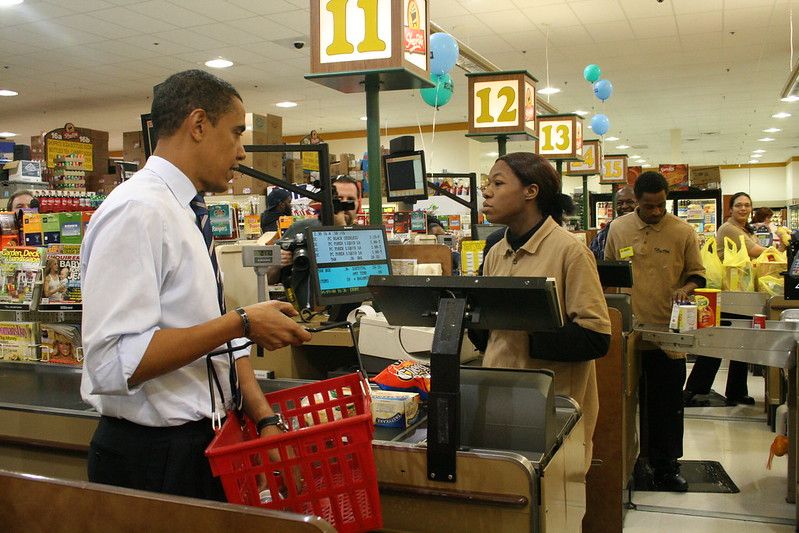 ning citizens who had been promoted to managers. “I was so proud that moment, watching him bring up people that I bought to him years ago that's managers now.”
ning citizens who had been promoted to managers. “I was so proud that moment, watching him bring up people that I bought to him years ago that's managers now.”
Pandemic protections
Jeff and other Wakefern cooperative members prepared early for COVID-19, having been alerted by peers from Asia and Italy.
“Before the CDC came out with advice on masks, we procured masks and started requiring our employees to wear them, and we started temperature checks,” Jeff says.
“Every day there were innovations like plexiglass shields. We kept track of how many people were in the store at one time.” Graphics were placed on the floor to promote 6-foot distancing, and sanitizing stations were installed in the shopping cart area. Shower curtains separated self-checkout stations and, later, were hung behind cashiers.
“We immediately came out with hazard pay for all our workers to give them a reward for coming in,” Jeff says.
COVID-19 hit grocery retailers first. “But then it started to spread to all of our vendors,” Jeff says.
“Industry by industry would start to get shut down. And as it spread through the country and more and more of the food system was impaired, the logistics of getting product became very difficult. So then we had a new wave of figuring out, how do we get products to our stores?
“That was a much more difficult job than [after] the looting. The looting happened, we fixed it, we were open within a week.” Months into the pandemic, “we still have logistics problems getting certain kinds of merchandise.”
The pandemic has also disrupted office operations.
“Since COVID, I've had to increase the number of things that I handle,” Sandy says. Among them: adding third-party logistics companies like DoorDash to accommodate the increased demand for deliveries.
Josh notes that along with day-to-day operations, the business is also coping with the challenges of COVID and the aftermath of the looting.
“Various little things in our society that fall apart go unnoticed until they become a problem,” Josh says. One example is a coin shortage in the United States, which arose because nowadays fewer people are using cash.
“So now I'm trying to find coin. Our team is looking for ways to work without it.”
Challenges from right and left
Jeff has faced off with politicians from both sides of the aisle, opposing policies that hurt his customers and his business.
He's criticized conservatives' calls for a significant reduction in the Supplemental Nutrition Assistance Program (SNAP). “Of course, in a very impoverished area, the people count on that to get their food, and my business model counts on that,” Jeff says. “So we would often find ourselves in Washington fighting conservatives and explaining to them, you can't sustain an infrastructure to serve the poor if you take away the revenue of SNAP. Besides, we already know that the sink-or-swim mentality does not result in a lot of people miraculously going to work, because the opportunities just don't exist where they live.”
More devastating to his business, Jeff says, is the beverage tax imposed by Philadelphia's Democratic mayor, James Kenney. The tax, 1.5 cents per ounce, is levied on sweetened caloric (regular) and non-caloric (diet) non-alcoholic beverages.
“Of all the things I've dealt with, the beverage tax was the most absolutely damaging, and for absolutely no benefit to society.”
Despite his efforts to improve customers' health outcomes, Jeff says, Hispanic and Black consumers prefer sweet beverages. “It's a very hardwired preference.”
After the tax was instituted in the city in 2017, the price of sweetened beverages doubled in Jeff's Philadelphia stores. His fears came true: Shoppers with the means to do so traveled to suburban stores to buy their beverages and, while there, also bought their other groceries.
“It was devastating to revenues,” Jeff says. “Some of the stores were down 25%.” That blew up his meticulously designed business model for stores in low-income areas.
Jeff sold one of his stores “because, in my way of analysis, there was no way to correct the damage that was done.” He's still operating three other stores that are struggling because of the tax.
“And of course, after a lot of years and an incredible number of studies, what we feared the most was true: There was virtually no reduction in sugar intake among the poor.”
Public health researchers from Drexel University, for example, polled Philadelphians and those from neighboring areas outside the city a year after the tax went into effect. Of the city residents, 39% reported drinking fewer sugar-sweetened beverages than they did a year earlier, compared with 34% of respondents outside the city — not a statistically significant difference.
Public service initiatives
Jeff was a founder of the Pennsylvania Fresh Food Financing Initiative, a public-private financing program to attract grocery stores to underserved communities. The program began in 2004 and ended six years later when all its funds were deployed.
In 2009, Jeff and Sandy created a non-profit organization called Uplift Solutions, whose original purpose was to assist with grocery store development in low-income communities nationwide. It grew out of a request from Thomas Vilsack, Obama's Secretary of Agriculture.
Uplift now has an executive director and a team that includes Jeff and Sandy's youngest son, Scott, 23, a Saint Joseph's University student who serves as Uplift's fund development officer. The mission has also expanded.
Besides offering food service consulting nationally, Uplift provides workforce training to returning citizens through a program called Workforce Solutions. Via a program called Philly Food Rescue, it distributes food that would otherwise go to waste to groups serving the needy.
Jeff is also a board member of the Pennsylvania 30 Day Fund, which distributes up to $3,000 in forgivable loans to small businesses shut out of federal Paycheck Protection Program loans.
The program, created in April, has primarily helped urban minority- and woman-owned businesses that have struggled during COVID-19. In addition to providing the loans, fund officials offer advice to the business owners.
Planning for the future
The fifth generation of Browns has been working with a consultant to establish a collaborative business relationship.
Jeff and Sandy suspect that Scott might be interested in joining the company in the future.
“He seems very interested in the business, and he's very motivated by the mission,” Jeff says.
“Scott's people skills are off the charts. His emotional intelligence is incredible, and he's just beloved by everyone who meets him. And we could totally see how [Josh and Scott] would make a good team. But we'll have to see.”
There are two sons in between Josh and Scott. Alex, 27, works for a consulting business in Washington, D.C. Lenny, 24, aspires to be an app developer.
“Whether my brothers end up being involved in the operation of the business or not, they're always going to be part of my life and part of our family business in some way,” Josh says.
With the consultant, the four are “working out how we work together, how we think through problems, and how we don't allow childhood biases or things like that to interfere with success as a group and as a family,” Josh says.
“What does the organization look like 10 years out?” Sandy wonders. “There's so many logistics about that, and things that really need to be worked out and negotiated.”
LOOTING AND ITS AFTERMATH: FEAR, FRUSTRATION AND RESOLVE
Two of the Brown family's ShopRite supermarkets in low-income areas, one in the Parkside neighborhood of West Philadelphia and one in the Nicetown neighborhood of North Philadelphia, were destroyed by looters during protests over the killing of George Floyd by Minneapolis police. Machines were dismembered; glass was smashed; food, alcoholic beverages and medications were stolen; and items were flung from the shelves onto the floor.
Jeffrey Brown, chairman and CEO of Brown's Super Stores, contends that poor handling of the situation by Philadelphia officials was partly responsible for the extensive damage.
The looting started in Philadelphia's tony Center City on May 30, and the police department sent most of its resources there.
“It had the unintended consequence — which I think was predictable — of forcing [looters] into the poor neighborhoods,” Jeff says.
Brown's stores operated May 31 until the violence escalated. The city ordered all retail businesses to shut down that afternoon. The Parkside store fell under siege as soon as it closed.
“The store had a very heavy loss-prevention and security contingency, but they were overwhelmed fairly quickly,” Jeff says. “So we let the outside security go after a while.”
The Parkside store's loss-prevention staff locked themselves in the security office. Meanwhile, the looters were being captured on camera. “We knew everything they were doing, in the store and outside the store,” Jeff says.
“And we continually called the police, but with no response because the police had other priorities. And at some point, we told our loss-prevention [staff] to go out the emergency exit and leave because we didn't think it was safe for them.”
The Parkside looters ransacked the store through the night. The destruction lasted 15 hours.
Looting began at Brown's North Philadelphia store on the evening of May 31. “And again, we called the police and they also didn't have the resources to help there,” Jeff says.
The store was boarded up, but at about 12:30 a.m. on June 1, looters penetrated the barrier by driving a truck in reverse through the front doors.
The night crew inside the store heard explosives at about 4:30 a.m. Looters were blowing up ATMs. The employees fled to the roof and had to be rescued by the fire department.
Jeff wanted to rebuild the stores quickly but realized “I couldn't get anyone in there to work if they're under attack.
“I started to explain to the elected officials, I'm going to need real robust protection to get these stores rebuilt. I'm not going to want to spend money to rebuild the store if it's only going to get destroyed again. Until the rioting quiets down, I need to have absolute certainty that the stores will be protected. And I cannot get that from the police.”
Jeff urged the city to call the National Guard, to no avail. “I decided the way I was going to address it was to do an interview with the [Philadelphia] Inquirer — I would make my plea public and hold elected officials accountable that way.” That plan worked.
The National Guard's armored vehicles and automatic weapons may have upset neighbors, but store employees felt safe. Despite extensive damage to the equipment, the North Philadelphia store reopened June 5 and the Parkside store resumed operations June 7.
The Browns believe the looters were mostly from outside the stores' neighborhoods. “I never had the feeling that anyone betrayed the spirit of our relationship,” Jeff says. “I didn't see it as an attack on us other than just acting out over the situation, which, in a sense, is understandable.” — Barbara Spector
Copyright 2020 by Family Business Magazine. This article may not be posted online or reproduced in any form, including photocopy, without permission from the publisher. For reprint information, contact bwenger@familybusinessmagazine.com.


